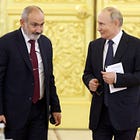
This article is brought to you by American Purpose, the magazine and community founded by Francis Fukuyama in 2020, which is now proudly part of the Persuasion family.
Moldova, a tiny Eastern European country sandwiched between Ukraine and Romania, could soon humiliate Russia in a way that will be difficult for the Kremlin to recover from. If the former Soviet republic of around 2.4 million people stays on the path toward European Union integration, it might have the opportunity to do something few would have ever imagined: to militarily defeat the Russian Federation.
Ever since Russia launched its invasion of Ukraine in 2022, Moldova has been on the brink of destabilization. According to reports, Moscow’s long-term goals in the country include establishing stable pro-Russian influence groups within Moldova’s political and economic elites, as well as fostering a negative attitude toward NATO. The EU, on the other hand, granted Moldova (one of the poorest European nations) candidate status in June 2022, while the authorities in Chisinau have set 2030 as the target year for European Union accession.
Not all Moldovans support the plan. But in 2024, slightly more than 50% of voters in a referendum backed the government-proposed constitutional changes and the country’s commitment to joining the EU. The ballot was held alongside the presidential election, in which pro-EU incumbent Maia Sandu was re-elected with 55% of the vote.
Her victory is primarily attributed to the unprecedented engagement of the Moldovan diaspora in the West. They turned out in large numbers for both the referendum and the election, securing the country’s pro-EU course. The Kremlin, however, questioned Sandu’s victory, accusing the Moldovan authorities of preventing “hundreds of thousands of Moldovans living in Russia” from voting.
Now, ahead of tomorrow’s parliamentary elections, Kremlin spokesman Dmitry Peskov once again accused Chisinau of “disenfranchising a large portion of Moldova’s population by denying them the right to vote.” He was likely referring to claims from Moldova’s breakaway region of Transnistria—officially the Pridnestrovian Moldavian Republic (PMR), a narrow strip of land along the Dniester River bordering Ukraine—that the authorities in Chisinau have sharply reduced the number of polling stations available to Moldovan citizens living in the unrecognized republic for the upcoming elections.
Sandu, on the other hand, blamed Russia for an “attempt to sway the vote,” while Moldovan police arrested at least 74 people over an alleged plot to organize “mass riots” in the country. This suggests an escalation in plans for potential disruptions, while the United States appears not to be paying sufficient attention.
As a result of USAID cuts, independent media outlets, human rights organizations, and civil society initiatives in Moldova have been adversely affected. It is now the EU, rather than the United States, that is investing in the former Soviet republic, aiming to secure its current geopolitical vector. The recent visit to Moldova by French President Emmanuel Macron, German Chancellor Friedrich Merz, and Polish Prime Minister Donald Tusk can be interpreted as a clear show of support for Maia Sandu’s Party of Action and Solidarity (PAS) ahead of the vote.
Last year, likely in an attempt to further divide Moldova, Moscow openly backed Evghenia Gutul, the governor of the country’s pro-Russian autonomous region of Gagauzia. However, last month she was sentenced to seven years in prison on charges related to alleged illegal financing of the opposition Shor Party. The Kremlin is now believed to support the opposition Patriotic Electoral Bloc, although Moscow’s room for maneuver in Moldova is limited by geography.
Even if pro-Russian forces come to power, Moscow is unlikely to have an effective mechanism to influence policymaking or reverse the nation’s pro-EU trajectory. Sandwiched between EU member Romania in the west, and Ukraine in the east, a potential pro-Russian Moldova would find itself isolated, and would almost certainly sink even deeper into poverty.
As such, it would be in a similar position to Transnistria, which hosts around 1,500 Russian troops who were deployed there as a result of the war that broke out in 1992 following the breakup of the Soviet Union.
Transnistria represents a trump card that Ukraine, Moldova, and the West could use against Moscow at any time. It is estimated that half of its 300,000 residents have Russian citizenship, while others hold Moldovan, Romanian, as well as unrecognized Transnistrian passports. In 2022, the Parliamentary Assembly of the Council of Europe designated the PMR a “territory occupied by Russia,” giving Chisinau the green light to eventually restore its sovereignty over the region.
There are fears in Russia that, in the event of a PAS victory or potential destabilization of Moldova, Ukraine—whether acting alone or alongside some NATO countries—could launch a military incursion into Transnistria. Russian media are already accusing Ukrainian President Volodymyr Zelensky of announcing plans to “destroy the PMR.” Such rhetoric follows Zelensky’s submission of a bill to parliament that would permit units of the Ukrainian Armed Forces to be deployed abroad.
If Kyiv really decides to provide military support to its small neighbor, Russian chances to preserve its de facto control over Transnistria will narrow significantly. In order to reach the PMR, Russian troops would first need to seize the Ukrainian port cities of Mykolaiv and Odessa, which at this point seems extremely improbable. That is why even Russian analysts openly admit that the loss of the PMR would represent a disaster for Moscow.
Ukraine undoubtedly has the military capacity to capture the region. Whether it will do so depends on Kyiv’s political will and approval from the West, including the United States. Although Moldova’s military might not be able to defeat the Russian-backed PMR on its own, it could still reap the benefits of a potential Ukrainian (or a joint Ukrainian-Moldovan) military operation.
Fully aware that such an outcome would represent a strategic defeat for Russia and have an extremely negative impact on its image, the Russian Foreign Intelligence Service is accusing NATO of planning to assist Ukraine in its alleged plans to seize Transnistria. The Kremlin seems to be crafting a narrative to whitewash its potential defeat in the PMR—portraying NATO, rather than Moldova or Ukraine, as the key player in the dismantling of the Russian-backed Pridnestrovian Moldavian Republic.
In reality, in the event of a war, Moldova would emerge as the winner by restoring its sovereignty over Transnistria. The Eastern European country is now at a crossroads. It can push forward with its European future and risk conflict, or face growing instability and outside pressure. What happens after the parliamentary elections will likely shape not only Moldova’s future, but also the balance of power in the region.
Nikola Mikovic is a freelance journalist, researcher, and analyst based in Serbia.
Follow Persuasion on Twitter, LinkedIn, and YouTube to keep up with our latest articles, podcasts, and events, as well as updates from excellent writers across our network.
And, to receive pieces like this in your inbox and support our work, subscribe below:






Thanks for explaining the forces at play. I'm glad Moldova is (mostly) western oriented and I wish it well tomorrow and beyond.